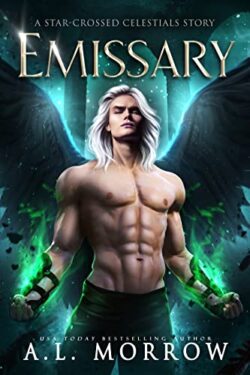 Emissary: An MM Forbidden Romance
Emissary: An MM Forbidden Romance Star-Crossed Celestials
Gat Romance, Gay Fiction, Gay Fantasy
SourGirl Books
Jan 25,2023
Kindle
224
Amazon
The line between angel and demon is razor thin. No one knows this better than Kai.
As an Emissary of death, darkness follows Kai like a shadow, leaving him touch-starved and lonely. Tormented by the error in judgment that killed his only love, he accepts an assignment to redeem himself: hunting down the demons destroying the mortal realm. But fate takes a turn, and Kai finds himself drawn to one of his targets instead.
Demonic martial arts expert Byron Black has struggled to survive his entire life. He has fought for every breath he’s taken and each bite he’s eaten, yet in the instant when his demise finally seems inevitable, death incarnate steps forward and spares him. Kai is as beautiful as he is terrifying, and although Byron suspects the angel’s interest in him is more than it appears, he can’t stay away.
Together, the pair search for answers regarding who wants Byron dead—and why—but uncovering the truth might destroy them both in the process. Can Kai defeat his inner demons to save the one that has crawled into his bed?
Set in the Star-Crossed Celestials universe, Emissary is a standalone novel featuring an array of creepy crypts and crematoriums, train-top sword fighting, an excessive number of buckles and buttons, and (of course) a Happily Ever After. It can be read as a companion story to the Star-Crossed Celestials Duet, best enjoyed after reading Watcher (Book 1) and Messenger (Book 2).

Review by Gordon Phillips
Member of the Paranormal Romance Guild Review Team
Emissary is a contemporary fantasy MM romance novel within Morrow’s Star-crossed Celestials series. At just over 69,000 words, Emissary is a fast-paced, action-packed adventure story set in a fantasy world that is compelling and not a little swashbuckling.
Kai (short for Malakai, (which means angel or messenger) is an Emissary, a harbinger of death. He has been assigned to participate in a culling of demons that is being carried out by the celestials. Demons are the bad guys, principally responsible for infiltrating human governments and causing the copious bloodshed of the 20th century, and Kai is taken to a demon fight, a kind of back-street cock fight complete with audience and betting, where he sees what trained demons can do in terms of their own martial arts.
In the fight, the smaller demon wins, to everyone’s surprise. Kai is struck by how innocent the winner looks, and reflects on whether demons can be innocent. This particular demon is Byron. He lives with an adopted family in the slums of Rio de Janeiro, all dirt poor and struggling to keep their heads above water.
Kai’s step-siblings are, like him, demons, their mother being a celestial, for demons in this world are the progeny of celestials (generally, Watchers) with humans. This concept borrows from the Nephilim story in the Book of Genesis of the Bible, where Old Testament angels fell in love with human women, fathering a race of Nephilim (giants). Morrow’s creation is a variation on this, in which the progeny are actual demons, complete with horns and glowing eyes, though they can assume human shape with some effort.
Kai is given a hit list of demons to kill, and discovers to his dismay that Byron’s name is on it. Byron, knowing he is being hunted, flees. Kai pursues, but with indeterminate intent. During this this hunt, Kai and Byron are thrown into repeated contact, and both realize they are strongly attracted to each other.
In his challenging situation, Kai begins to question the why’s of the culling campaign, for there is an alternative. The celestials have set up a kind of open-air prison in Las Vegas (“sin city” and shades of Stephen King’s The Stand) for demons and wayward Watcher celestial parents. The conundrum facing Kai and Byron, who are truly “star-crossed,” leads to an actual challenging of the system and is resolved in a surprise twist ending.
Morrow’s fantasy world here is well-imagined and explored, although there are several minor problems with it. For example: What the exact job of the Emissary is, since humans can and do die without an Emissary being present. Kai seems to kill people only when it is their time, so as not to rupture their souls, which if left unharmed naturally go on to some kind of afterlife. The functionality of all of this is puzzling.
Also, and rather surprisingly for a story in which violence and killing form a major part, Emissary might be said to suffer from being a little “scrubbed.” The good guys are good, the bad guys are bad, and the surprises when they come tend to be unsurprising surprises, such as the revelation that power and wealth lead to corruption, and that the downtrodden are inherently superior in virtue.
Finally and most disappointingly, the question of what makes demons, well, demonic, remains unexplored or explained. They are said not to have souls, so they can be killed without any concern for it being their time. And they reputedly cause all kinds of problems for humans. Yet Byron (and to some degree his siblings) is about as good as anyone can be: thoughtful, generous, kindly, and so on. So, given that apparently only some demons are bad, what’s the deal with this wholesale culling of demons? Also, how did the difference between Byron’s family and the “bad” demons come about?
In conclusion, Emissary is well-conceived and well-written, and its supernatural world is compelling and interesting. What it would benefit greatly from, however, is a deeper dive into the underlying causes behind the behaviors of its inter-racial struggles, the struggles that ensue, and a greater clarity in the depiction of these natures and causes in each character.
